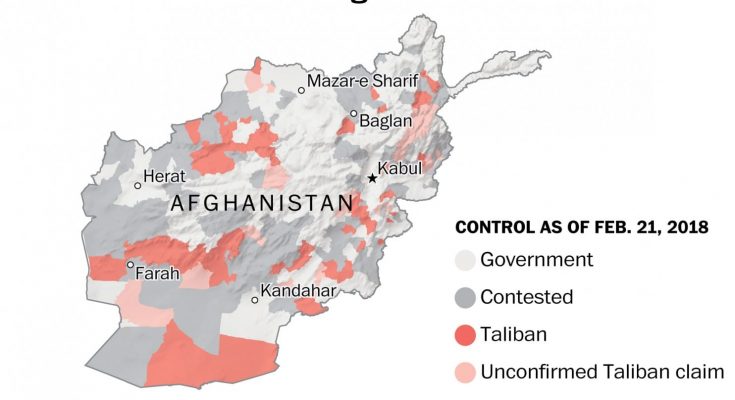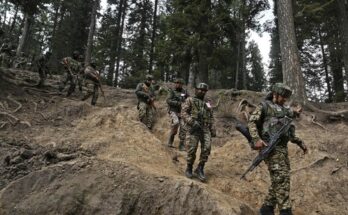ISLAMABAD, Pakistan — Just a few weeks ago, after a string of bloody insurgent attacks left 150 people dead in Kabul, Afghan President Ashraf Ghani lashed out in frustration, vowing to take revenge on the battlefield of a war that Afghan and NATO forces are still struggling to dominate after 16 years of fighting.
But Wednesday, in a striking turnaround that implicitly acknowledged the folly of that threat, Ghani took the opposite tack, inviting Taliban insurgents to “unconditional” peace talks, offering them dramatic concessions and recognizing the extremist militant group as a legitimate political force in Afghanistan’s future.
The violence continued Friday, when a car bomb aimed at a NATO military convoy in Kabul killed two civilians and injured 14. No group claimed responsibility, and there has been no immediate formal response from Taliban leaders to the president’s unprecedented proposal at the opening of an international conference in the Afghan capital.
But Ghani’s offer — which included a cease-fire and prisoner swap, passports for Taliban representatives and their families, Taliban participation in elections and a review of the constitution as the group has demanded — was cheered by delegates from 25 countries who gathered to brainstorm how to create conditions for peace.
For months, hopes of reviving long-stalled peace talks with the Taliban have seemed virtually dead. The insurgents have continued waging an aggressive military campaign in the countryside, where they now control or influence nearly half of Afghan territory, while staging repeated attacks in the capital despite intensified security.
“Innocent people are being killed left and right,” Trump said Jan. 29. “We don’t want to talk to the Taliban. We’re going to finish what we have to finish.”
Since then, however, Ghani has made comments welcoming talks with insurgents under certain conditions. On Wednesday, he went even further and used more respectful language, treating the Taliban as a recognized political group.
“We are making this offer without preconditions, in order to lead to a peace agreement,” Ghani said. He described his action as an effort to “save the country” and said that he would not “prejudge” any group interested in peace.
Although the Taliban has not publicly responded to Ghani’s offer, it has put out several feelers recently. Two weeks ago, the group issued an unusual written appeal to the “American people,” asking them to pressure U.S. officials to end the conflict. The letter, emailed to the news media, cited statistics on the human and economic costs of the war, while calling U.S. officials “warmongers” and usurpers.
In the past week, Taliban officials have contacted various interlocutors, including news outlets and academics. On Thursday, the group posted a letter to Barnett R. Rubin, an Afghanistan expert at New York University, who wrote an open letter in the New Yorker this week encouraging the Taliban to join the peace talks. The Taliban response, shared through Twitter on Wednesday, was polite but dismissed this week’s conference in Kabul as a vehicle for seeking the insurgents’ surrender.
“Such efforts seek surrender from the Islamic Emirate at a time when the Islamic Emirate . . . has defeated an international arrogant power like America,” the letter said, using the formal name of the Taliban movement.
The letter said the group does not “seek conflict with anyone, including the United States.” But it claimed that Afghanistan is “occupied” and that its government is being “imposed on us.” To recognize and talk with Kabul officials, the letter said, would be to accept “the same formula adopted by America to win the war.”
In next-door Pakistan, which Afghan and U.S. officials accuse of harboring Taliban militants, officials endorsed Ghani’s overture. The Pakistani national security adviser, retired army Lt. Gen. Nasser Khan Janjua, said the government would do its best to support “this noble initiative.”
Some Afghan critics, though, saw Ghani’s outreach as capitulation. Amrullah Saleh, a former national intelligence chief, called the president’s speech “a total appeasement to the enemy.” He noted that after the January attacks in Kabul, Ghani called the nation to arms in defense of peace. “Now he offered the terrorists a super olive branch,” Saleh said.
On Wednesday, Al Jazeera quoted an unnamed Taliban official as saying the group was ready to hold direct talks with American officials at its office in Doha, the capital of Qatar. The official warned, however, that if the Afghan government shuts down or moves that office, it could sabotage any negotiations. He also reiterated that the departure of U.S. troops is a precondition for any talks.
The Qatar office was opened about five years ago as a diplomatic site for Taliban representatives to meet with others. But little came of that effort, and Ghani recently has been reported as planning to move the site to Saudi Arabia.
On Tuesday, Afghan officials insisted that the Taliban must negotiate with them but said they are ready to meet insurgent officials anywhere. “If you are Afghans, come and talk with Afghanistan,” Haroon Chakhansuri, a spokesman for Ghani, told Tolo News TV in Kabul. “The Afghan government is ready to talk.”
Sayed Salahuddin in Kabul contributed to this report.






